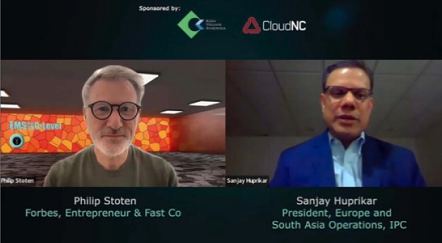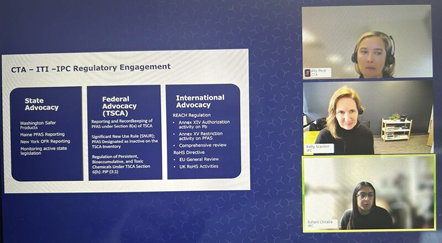 |
Dear IPC Members:
I hope you and yours are well.
Here’s your five-minute update on current government policy actions that may affect your business. |
Here in North America, we continue to see government support of printed circuit boards (PCBs) and advanced packaging — something IPC has long-championed. In fact, the words “advanced packaging” and “printed circuit boards” were prominent in a joint statement last Friday by U.S. President Joe Biden and Canadian Prime Minister Justin Trudeau. Our message is getting through!
IPC will continue to advocate for long-term policy and funding to rebuild the entire ecosystem that sustains innovative, resilient, and secure electronics manufacturing.
Meanwhile, the electronics manufacturing industry is a bright spot in the current global economic climate. IPC's most recent report on the industry shows continued growth and optimism in critical areas despite economic uncertainties.
All the best,
Chris Mitchell
Vice President, Global Government Relations
The Headlines at a Glance:
TOP NEWS OF THE WEEK
- IPC Praises U.S. Prioritization of Domestic PCBs and IC Substrates
- CHIPS Act Success Hinges on Establishment of IC Substrate Pilot Facility
QUOTE OF THE WEEK
- IPC’s John W. Mitchell Welcomes “Presidential Determination” on PCBs and IC Substrates.
IPC ADVOCACY AND YOU
- How Can Government Help or Hurt You in 2023?
ENVIRONMENT AND HEALTH
- IPC Shares Industry Input on EPA’s Proposed “Significant New Use Rule”
- IPC Supports Calls for Harmonized Corporate Sustainability Due Diligence
- ECHA Opens Consultation on PFAS Restriction Dossier
EUROPEAN UNION
- EU Commission Proposes Legislation to Boost Competitiveness and Climate Neutrality
TRADE AND SUPPLY CHAIN
- IPC Applauds United States-Canada Partnership to Strengthen Advanced Packaging
- IPC Report Shows Optimism in Industry Despite Economic Uncertainties
UPCOMING EVENTS
- What is the Current Economic Outlook for Manufacturing?
HELP US SPREAD THE WORD ON SOCIAL MEDIA
KEEP IN TOUCH WITH US
TOP NEWS OF THE WEEK
IPC Praises U.S. Prioritization of Domestic PCBs and IC Substrates: IPC welcomed U.S. President Joe Biden's "presidential determination" prioritizing the domestic development of printed circuit boards (PCBs) and advanced packaging — including IC substrates — under Title III of the Defense Production Act (DPA). IPC and its allies have been calling on President Biden to address urgent industrial base vulnerabilities, and this move is another step toward securing the domestic supply of critical electronic components; moving beyond a silicon-only mindset; and rebuilding the wider U.S. electronics manufacturing industry. IPC Contact: Chris Mitchell.
CHIPS Act Success Hinges on Establishment of IC Substrate Pilot Facility: The success of the CHIPS for America program is dependent on the quick establishment of a U.S. pilot facility for manufacturing integrated circuit (IC) substrates, according to a new report from the IPC Chief Technologist Council. The report highlighted that the United States has limited capabilities to produce the most advanced IC substrates, which are crucial for the production of advanced semiconductors and systems. IPC will continue to support long-term policy and funding to rebuild the entire ecosystem that sustains innovative, resilient, and secure electronics manufacturing in the United States. Read the full report here. IPC Contact: Chris Mitchell.
QUOTE OF THE WEEK
 |
“Increasing domestic chips production without bolstering the manufacture of cutting-edge PCBs and IC substrates risks lengthening the semiconductor supply chain, because many of the chips made in California or Ohio will still have to be sent outside of the United States for packaging and assembly into finished products.”
– IPC President and CEO John W. Mitchell welcomed a new “presidential determination” to prioritize the domestic development of printed circuit boards (PCBs) and semiconductor advanced packaging — including IC substrates. |
IPC ADVOCACY AND YOU
How Can Government Help or Hurt You in 2023? IPC is conducting a survey to gather information on the top concerns of electronics manufacturing professionals like you and how government policies can either help or hurt you in the next few years. The survey, which will help shape IPC's advocacy efforts in 2023, takes only a few minutes to complete and is a great opportunity to voice your concerns and shape future policies. Read an IPC blog about how you can be involved in IPC advocacy in 2023. IPC Contact: Jeff Goldberg.
ENVIRONMENT & HEALTH
IPC Shares Industry Input on EPA’s Proposed “Significant New Use Rule”: IPC, Consumer Technology Association (CTA), and Information Technology Industry Council (ITI), jointly submitted comments on EPA's proposed rule that would require companies to submit significant new uses of approximately 330 per- and poly-fluoroalkyl substances (PFAS) currently listed as “inactive.”The comments emphasized the need to maintain the exemption for articles and highlighted the challenges of collecting data on specific PFAS across the supply chain. Check out IPC’s new blog post for more information. IPC Contact: Suhani Chitalia.
IPC Supports Calls for Harmonized Corporate Sustainability Due Diligence: IPC recently signed a letter alongside other European associations urging the European Union to establish a level playing field in corporate due diligence regarding human rights and environmental impacts assessments across the bloc. IPC welcomes the involvement of all industries in the evolution of the proposed legislation and encourages them to share their perspectives. Please let us know if you have any questions. IPC Contact: Kelly Scanlon.
ECHA Opens Consultation on PFAS Restriction Dossier: The European Chemicals Agency (ECHA) has opened the consultation period for the EU REACH restriction on per- and polyfluoroalkyl substances (PFAS). Stakeholders are encouraged to provide technical input by addressing specific questions outlined by ECHA, such as PFAS emissions in the end-of-life phase. Additionally, ECHA will be holding a webinar on April 5, to discuss the consultation period process forstakeholders. Questions on the restriction can be submitted to ECHA prior to the webinar. The consultation period will be open until September 25. IPC Contact: Suhani Chitalia.
EUROPEAN UNION
EU Commission Proposes Legislation to Boost Competitiveness and Climate Neutrality: The European Commission recently proposed the Net-Zero Industry Act (NZIA) to support the transition to climate neutrality and enhance Europe's net-zero industry competitiveness. The legislation, introduced in response to the U.S Inflation Reduction Act (IRA), will introduce measures to support key sectors in transitioning to a net-zero economy in accordance with the Green Deal Industrial Plan. While the EU Commission criticized the IRA’s use of domestic content requirements for violating World Trade Organization (WTO) trade law, the inclusion of similar clauses in the legislation has raised similar compliance concerns . This development signals a shift in regional industrial strategies towards reducing reliance on global supply chains. IPC Contact: Alison James .
TRADE AND SUPPLY CHAIN
IPC Applauds United States-Canada Partnership to Strengthen Advanced Packaging: U.S. President Joe Biden and Canadian Prime Minister Justin Trudeau this week announced a joint commitment to strengthen advanced packaging for semiconductors and printed circuit boards (PCBs) in North America. The partnership, which includes an additional $50 million in U.S. Defense Production Act funding for those purposes, is a meaningful step towards rebuilding a North American electronics manufacturing industry and was the third time in a month that the U.S. Government called for a “more than just chips” approach to implementing the CHIPS Act. Read IPC’s statement here. IPC Contact: Chris Mitchell.
IPC Report Shows Optimism in Industry Despite Economic Uncertainties: According to IPC’s March Supply Chain Sentiment Report, the electronics manufacturing industry seems to be optimistic despite the increasing economic uncertainties. The latest report suggests that industry demand remains steady, production is consistent, and labor challenges might be easing. Moreover, companies expect to raise prices in 2023, indicating their confidence in the market. You can read the full report here. IPC Contact: Shawn DuBravac.
UPCOMING EVENTS
What is the Current Economic Outlook for Manufacturing? Virtual, April 4, 2023. Join IPC Chief Economist Shawn DuBravac for a free webinar on recent economic data and the current state of the manufacturing sectors in Europe, the United States, and China. Recession has become the base-case scenario for the United States and Europe, but the depth and duration of that recession is still up for debate. In this webinar, you will review what to expect in the coming quarter in terms of growth; the outlook for inflation; and the current health of the supply chain and how it might evolve in the months ahead. IPC Contact: Shawn DuBravac.
HELP US SPREAD THE WORD ON SOCIAL MEDIA
 |
|
 |
“What can we do on a complementary basis to benefit the industry?” IPC President of Europe and South Asia Operations Sanjay Huprikar participated in a wide-ranging interview about IPC’s activities in Europe, and the importance of collaboration and consensus when addressing issues such as supply chain resilience, sustainability, the CHIPS Act, and more. |
The American Chemistry Council (ACC), with support from IPC, Consumer Technology Association (CTA), and Information Technology Industry Council (ITI), held an in-depth webinar on the critical chemical management issues affecting the electronics manufacturing industry. IPC’s Kelly Scanlon and Suhani Chitalia addressed many critical policies that overlap both the chemical and electronics industries, with a focus on global policy discussions on flame retardants, per- and polyfluorinated Substances (PFAS), and more. |
KEEP IN TOUCH WITH US
Meet the IPC GR Team: Whether it’s engaging with policymakers in Washington, D.C., in the European Union or in China, the IPC Government Relations (GR) Team proactively seeks opportunities to educate, inform and influence policymakers on policies that spur innovation, growth and competition, while protecting human health and the environment. But our success depends on your support and engagement. Learn more and get involved in IPC advocacy today! IPC Contact: Chris Mitchell.
Subscribe to IPC Global Advocacy Report: If you’re a member of IPC, manage your e-mail preferences and opt in to receive “Advocacy” updates. If you are not an IPC member — or you’re not sure — please send a note to friends@ipc.org, and our staff will add you to the list.
Follow us on Twitter and LinkedIn.
Contact one of us if you have any questions or insights to contribute.
See prior editions of Global Advocacy Report.
Explore our IPC Government Relations information online.
|